So you’re thinking of buying your girlfriend, or fiancé, or wife, or mother a dozen roses for Valentine’s Day? You’re a good man!
But here’s the thing: Stores jack up the price of roses leading up to Valentine’s Day. You’re likely to pay $20 or more for a dozen, double the normal price. What gives? Did you know roses are on sale for half-price the week after Valentine’s Day?
So what’s a good man supposed to do? In light of the pricing, is it better to buy roses before or after the big day? Well, it depends on what kind of signal you’d like to send your partner…
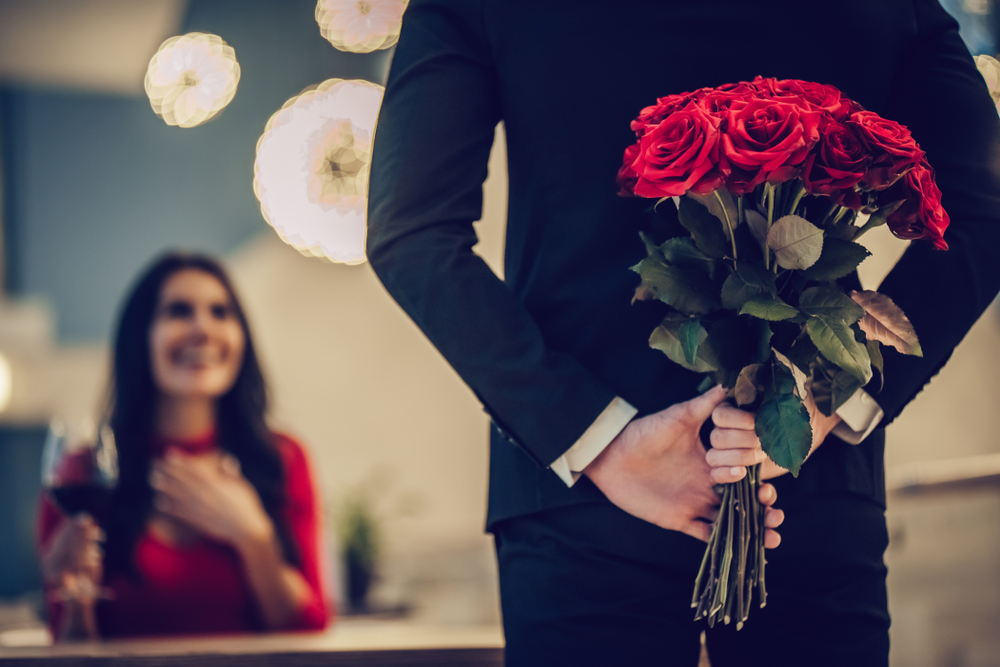
Flowers As An Economic Signal
Economic signaling is the idea of conveying information about who you are or what you feel by the actions you take. Our actions send “signals” that tell others about our underlying personal qualities and intentions that might otherwise be hard to communicate. In the context of romantic relationships, this translates to: “Don’t tell her how great you are, show her!”
Flowers are an interesting case study. I’ve always been skeptical of their practical value. Why would you pay $20 for something that will die in a week? It’s like buying your child a goldfish for a pet (though for many parents, the short shelf-life of a goldfish is a feature, not a bug). But it is precisely because flowers are impractical that they have signaling value as a gift. You buy your partner flowers because they display how much you love her — so much that you’re willing to be impractical to show it.
Here’s another signaling gift that originally had me scratching my head: I was once told about a “perfect melon” given as a dinner gift in Japan, sometimes costing up to $500. At first, I was floored: “Really? Why would anyone pay $500 for a melon? Even if it is “perfect”, it probably tastes the same as a $5 melon, right? That’s so stupid.” But melons, like flowers, aren’t meant to have practical, measurable value — instead, they’re meant to show others how much you care.
Research shows that your partner may have higher gift satisfaction from cash or gift cards. Psychologist Mary Steffel has studied this exact question and concludes: “If you’re not sure what your recipient wants, give them the gift of flexibility.” (New York Times, “The Science of Gift Giving,” 12/12/2016)
But, for Valentine’s Day, gift satisfaction isn’t the point. Cash and gift cards lack personalized effort and thus often convey the wrong signal about you. Cash gifts remind us of the Seinfeld episode when Jerry gives Elaine $182, which turns out to be a complete disaster next to Kramer’s highly personalized red bench. Here’s the clip:
Here’s the bottom line: Flowers send the message that you’re willing to pursue beauty for the person you love, no matter how impractical or temporary. You don’t buy flowers because the flowers themselves are beautiful, you buy flowers because your feelings for the other person are beautiful.
Valentine’s Day Rose Prices
Okay, got it: flowers good, cash bad. But what about Valentine’s Day rose prices?
Here’s a primer: Rose prices go way up right before Valentine’s Day, when demand is highest and customers are least price sensitive. Then they drop after Valentine’s Day, when demand is low and stores offload dying inventory. In other words, stores raise prices into the holiday and slash them afterwards. Here’s what it looks like graphically:
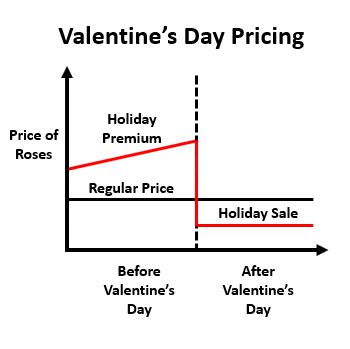
I know what you’re thinking: Arbitrage opportunity! Well, at least, that’s what I was thinking. Why pay double-the-price the day before Valentine’s Day when you can pay half-price the day after Valentine’s Day?
I confess, I used to take this approach. I used to buy my wife two dozen roses the week after Valentine’s Day. It was pretty brilliant: why pay $25 for one dozen when you can pay $20 for two dozen just a few days later? It felt like arbitrage to me — winning by taking advantage of irrational pricing.
What Are You Signaling?
After years of this, I realized that there was no arbitrage here at all. I was, unfortunately, sending the wrong message.
Pop quiz (multiple choice): What signal are you sending your partner when you bring home half-priced roses after Valentine’s Day? Complete the following sentence:
“She probably thinks you are …
- a.) … a smart shopper?
- b.) … a savvy suitor?
- c.) … a resourceful romantic?
- d.) … a cheapskate?
If you selected answer choice (d), you were right! “Give that contestant the jackpot, Johnny!”
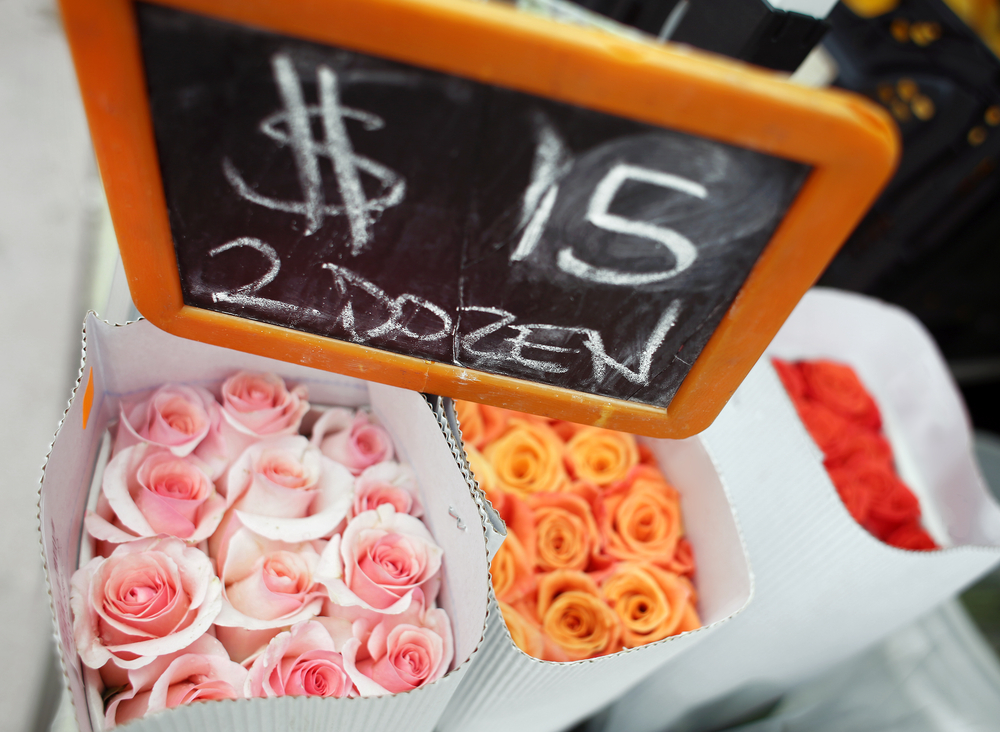
All those years buying half-priced roses for my wife, I signaled that I was cheap — not the hero, not the warrior, not the elk hunter that I wanted her to see. Instead, I showed that I cared more about saving a few bucks than I did about her. Not exactly what I wanted to convey.
I bought half-price flowers so many times that, once, when I surprised my wife with a non-Valentine’s Day bouquet, she looked at me, puzzled, and said: “Oh thanks! Were these on sale?” That’s when I knew I had a problem.

Here’s an evolutionary psychology perspective on signaling between the sexes from the book, Mate: Become The Man Women Want:
“Here’s the kicker, the thing about wealth you must get: women care less about money itself than about what it represents about the guy who made it…
That’s why most good women don’t actually care about a BMW as a car, or a managerial position as a title, or a condo on an upper floor as a living space. They care about them as signals of your underlying traits. Thus, your possessions are not “superficial” status symbols — they are material proof that you have positive traits needed to care for a woman, raise kids, and recover from losses.”
Tucker Max and Geoffrey Miller (2015), Mate: Become The Man Women Want, Little, Brown and Company, page 187. Emphasis in original.
We grow up and we learn. Now I recognize that buying flowers after Valentine’s Day shows that you’re cheap, whereas buying flowers before Valentine’s Day shows that you’re a high-quality mate. It turns out that displaying your love is worth more than a $10 discount (usually).
Sending A Counter Signal
Here’s a funny twist: After buying flowers on sale for so many years, I finally bought my wife a dozen roses at inflated, pre-Valentine’s prices. I put them in a vase on the kitchen table, and my wife was ecstatic: “Oh my God, honey! You *hate* buying roses at full price! That’s soooo sweet of you!!” It was, ironically, the best Valentine’s Day gift I ever gave her.

Economist Guide To Gift Giving
After years of turmoil from awkward gift giving, here’s my highly anecdotal and non-scientific guide to gift giving for your spouse or partner for each holiday:
- Valentine’s Day: Impractical but loving signal
- Mother’s Day: Day off from the kids (another irony)
- Birthday: Fun experience, like show tickets or spa day
- Christmas: Gift card or “Just tell me what you want”
- Anniversary: Something sentimental, no cash value
- Other holidays: If you’re buying gifts for other holidays, you may have bigger problems…
Although, now that I’ve written this guide, I’m probably going to have to do more counter-signaling to keep my wife guessing. I’ll keep you posted.
Postscript: Feb 20, 2019
Even anticipating the Valentine’s Day price bump, I didn’t expect how expensive flowers would be before the holiday. Here’s what I saw on Valentine’s Day at Wegman’s (admittedly a higher-end grocery store). I was floored by the prices, which must mean I’m getting older. “Prices were reasonable in my day, sonny!”
For $25, you can get just three roses (seriously!) in a vase:
For $35, you can get the standard dozen:
And for $55, you can get the “Farmer’s Bunch” (are they free-range roses?):
No thanks! I’ll pass at these prices, economic signals notwithstanding. Instead, I opted for a custom cake and over-sized balloon that I expect to last for three months (the balloon, not the cake):
What did you get this year for your Valentine…?
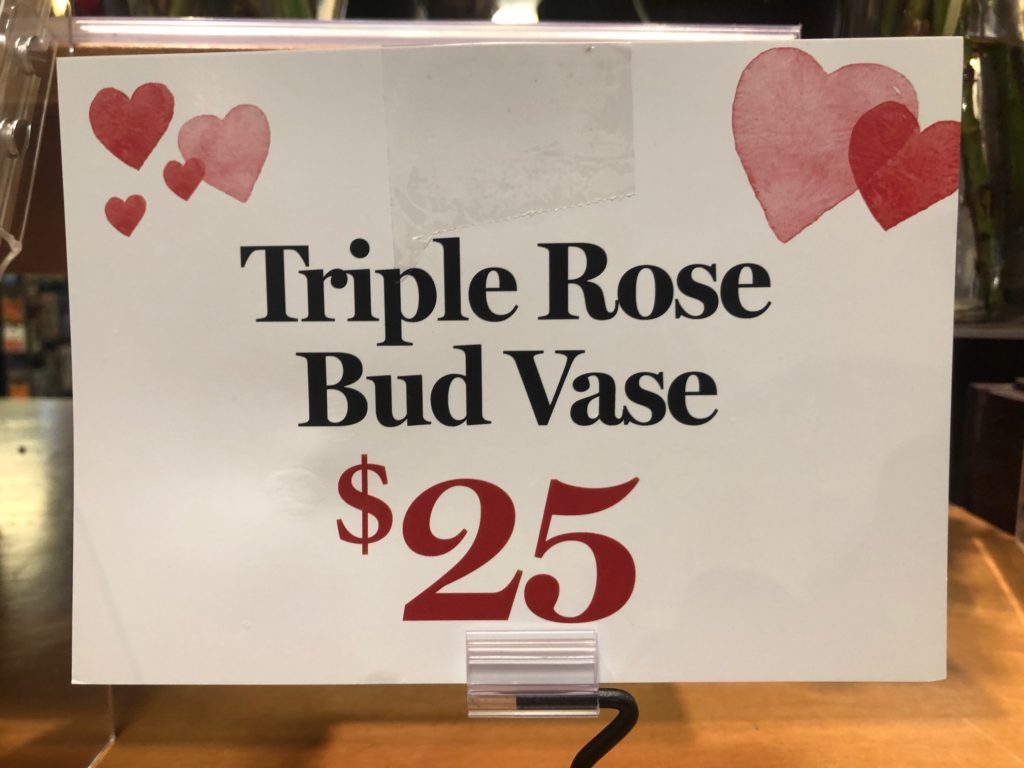
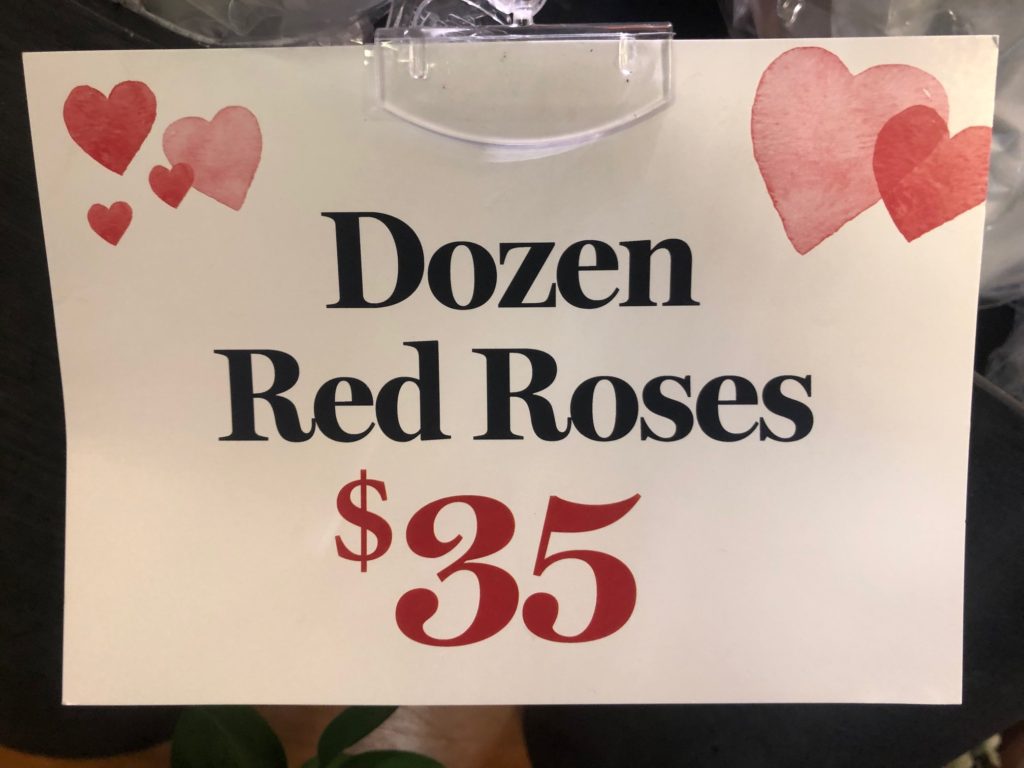
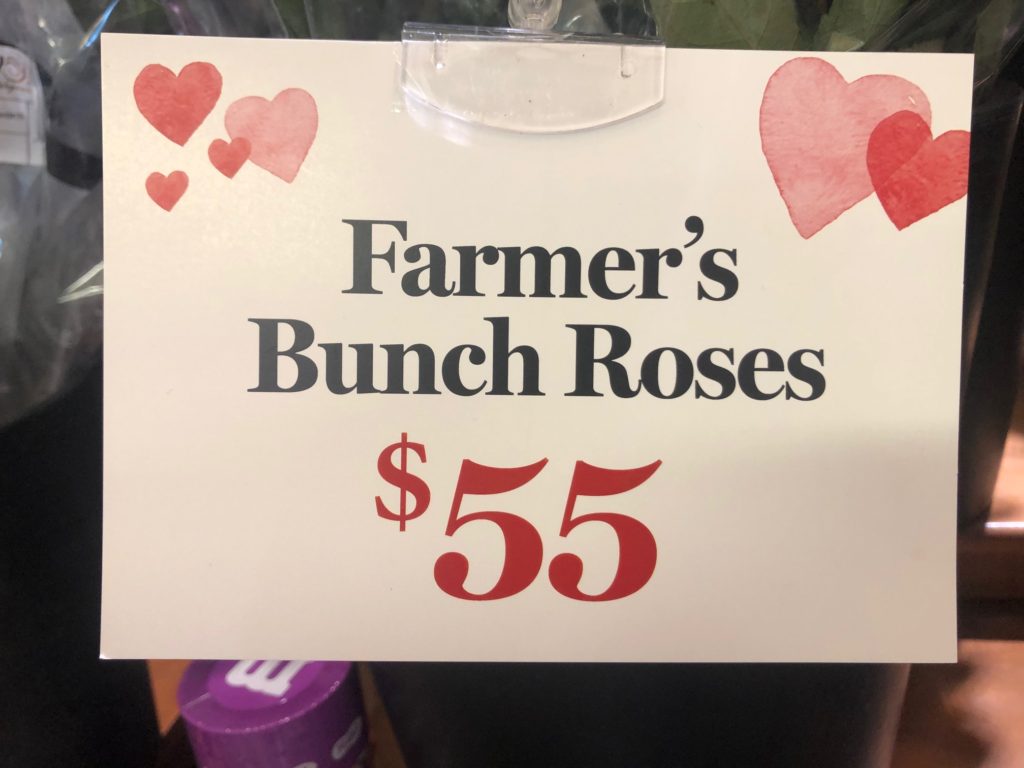
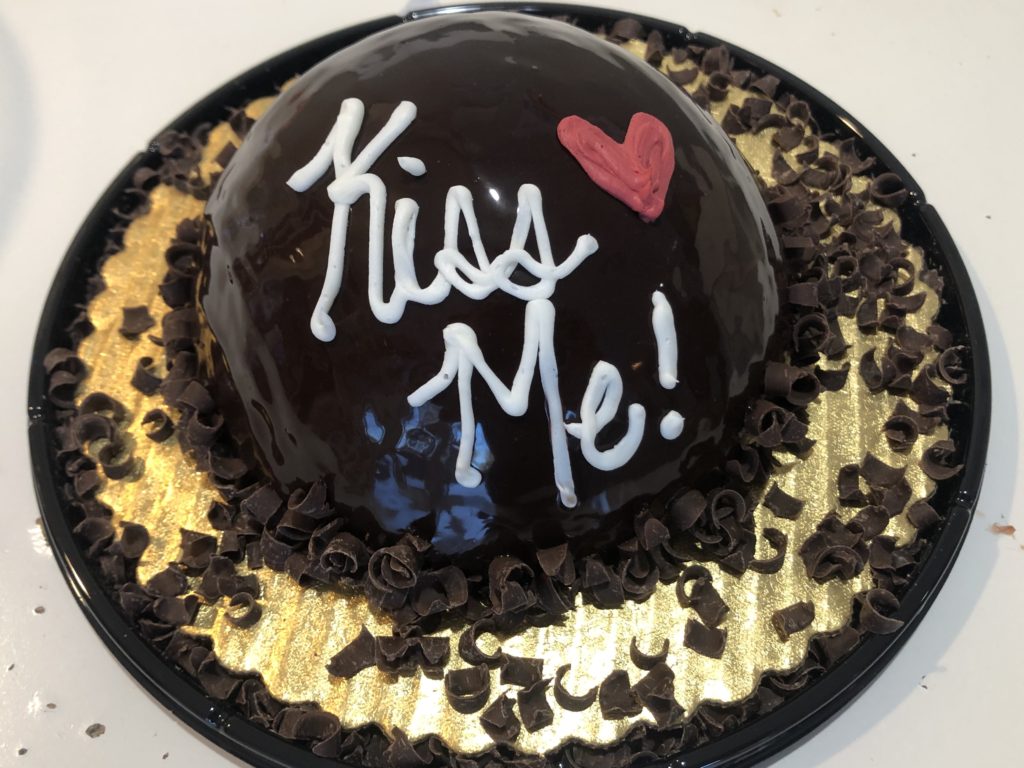
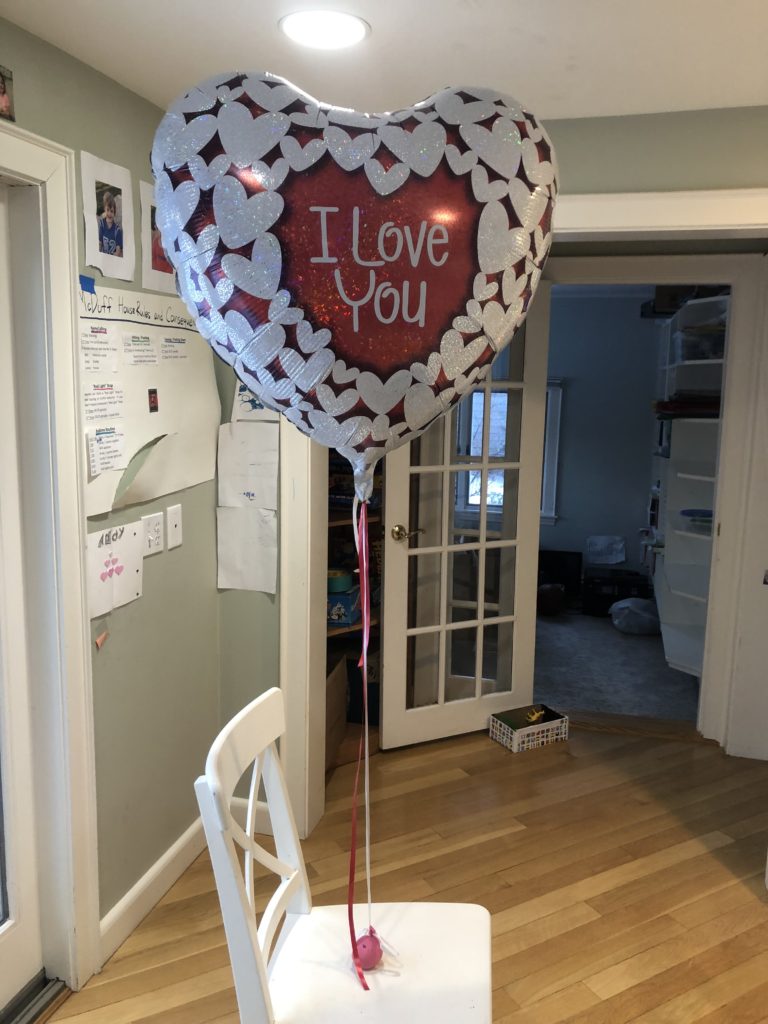
Reader comment: “For me personally, I would rather get flowers any other day if the year besides Valentine’s day. How big of an idiot are you if you don’t conform to the commercially designed holiday to celebrate your love? BUT the kicker here is, you actually have to buy flowers other days of the year. I think when you ONLY buy flower on valentines/anniversaries you’re missing the point. To me, it does not signal “I love you so much I bought you these flowers”, but rather “I picked up on social cues and felt pressured/obligated to buy you flowers”.
Yes, great points! I agree that “surprise” flowers on other days have more impact. After so much talk about flowers, I had to think of something more creative than flowers for my wife this year (shhhh… a big fun balloon and a chocolate cake!).
Totally hear you on conformity. We’ve got to signal *enough conformity* so that we’re not weird but not *too much conformity* that we’re boring. So complicated! 😆😆